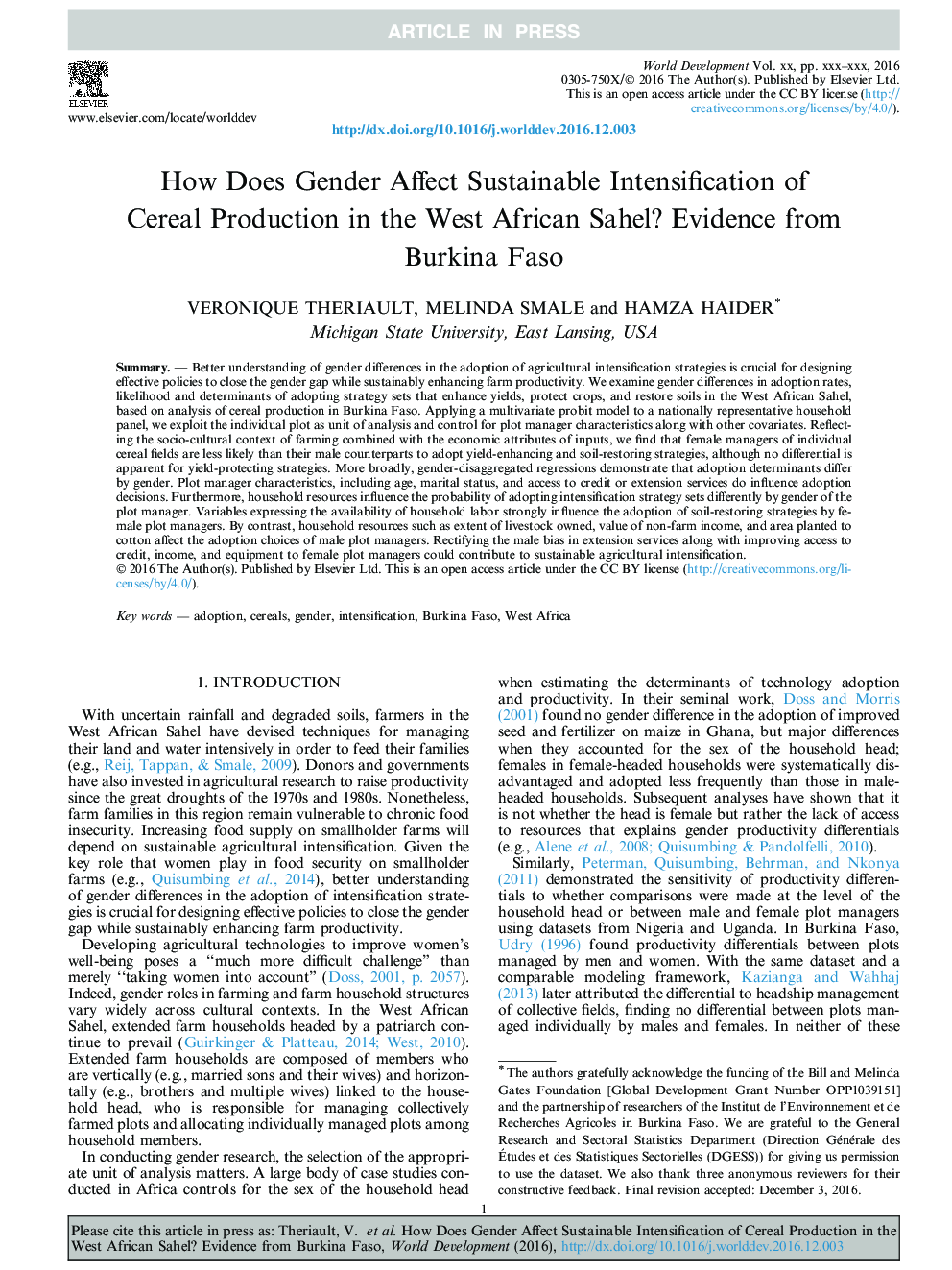| کد مقاله | کد نشریه | سال انتشار | مقاله انگلیسی | نسخه تمام متن |
|---|---|---|---|---|
| 5105033 | 1481126 | 2017 | 15 صفحه PDF | دانلود رایگان |
عنوان انگلیسی مقاله ISI
How Does Gender Affect Sustainable Intensification of Cereal Production in the West African Sahel? Evidence from Burkina Faso
ترجمه فارسی عنوان
چگونه جنسیت تأثیرات ثبات بخشیدن به تولید غلات در آفریقای جنوبی ساحل را تأمین می کند؟ شواهد از بورکینافاسو
دانلود مقاله + سفارش ترجمه
دانلود مقاله ISI انگلیسی
رایگان برای ایرانیان
کلمات کلیدی
تصویب، غلات و حبوبات، جنسیت، تشدید بورکینافاسو، غرب آفریقا،
ترجمه چکیده
درک بهتر تفاوت های جنسیتی در تصویب استراتژی های تشدید کشاورزی برای طراحی سیاست های موثر برای بستن شکاف جنسیتی و افزایش بهره وری مزرعه حیاتی است. ما بررسی تفاوت های جنسیتی در میزان پذیرش، احتمال و عوامل تعیین کننده در اتخاذ مجموعه های استراتژی که باعث افزایش بهره وری، حفاظت از محصولات و بازگرداندن خاک در آفریقای غربی ساحل می شود، بر اساس تجزیه و تحلیل تولید غلات در بورکینافاسو. با استفاده از مدل پروبیوتی چند متغیری به پانل خانوار نماینده ملی، از طرح واحد به عنوان واحد تحلیل و کنترل برای ویژگی های مدیر طرح، همراه با سایر متغیرها استفاده می کنیم. بازتاب بستر اجتماعی و فرهنگی کشاورزی همراه با ویژگی های اقتصادی ورودی ها، ما دریافت می کنیم که مدیران زن از مزارع غلات فرد کمتر از همتایان مرد خود برای اتخاذ استراتژی های تقویت عملکرد و بازگرداندن خاک کمتر است، اگرچه هیچ تفاوتی برای عملکرد محصول وجود ندارد محافظت از استراتژی ها به طور گسترده تر، رگرسیون های طبقه بندی جنس نشان می دهد که عوامل تصمیم گیری بر اساس جنسیت متفاوت هستند. خصوصیات مدیران، از جمله سن، وضعیت تاهل، و دسترسی به خدمات اعتباری و یا خدمات پس زمینه، بر تصمیم گیری های تصویب تاثیر می گذارد. علاوه بر این، منابع خانوار بر احتمال تصویب استراتژی های تشدید بر اساس جنسیت مدیر طرح، متفاوت است. متغیرهایی که بیانگر دسترسی کار خانگی هستند، به شدت بر تصویب استراتژی های بازسازی خاک توسط مدیران طرح زن تاثیر می گذارد. در مقابل، منابع خانوار مانند میزان دام های متعلق به، ارزش درآمد غیر کشاورزی و مساحت کشت شده به پنبه بر انتخاب های تصویب مدیران طرح های مردانه تأثیر می گذارد. تصحیح تعصب مردانه در خدمات پسران و بهبود دسترسی به اعتبار، درآمد و تجهیزات به مدیران زن می تواند به تشدید کشاورزی پایدار کمک کند.
موضوعات مرتبط
علوم انسانی و اجتماعی
اقتصاد، اقتصادسنجی و امور مالی
اقتصاد و اقتصادسنجی
چکیده انگلیسی
Better understanding of gender differences in the adoption of agricultural intensification strategies is crucial for designing effective policies to close the gender gap while sustainably enhancing farm productivity. We examine gender differences in adoption rates, likelihood and determinants of adopting strategy sets that enhance yields, protect crops, and restore soils in the West African Sahel, based on analysis of cereal production in Burkina Faso. Applying a multivariate probit model to a nationally representative household panel, we exploit the individual plot as unit of analysis and control for plot manager characteristics along with other covariates. Reflecting the socio-cultural context of farming combined with the economic attributes of inputs, we find that female managers of individual cereal fields are less likely than their male counterparts to adopt yield-enhancing and soil-restoring strategies, although no differential is apparent for yield-protecting strategies. More broadly, gender-disaggregated regressions demonstrate that adoption determinants differ by gender. Plot manager characteristics, including age, marital status, and access to credit or extension services do influence adoption decisions. Furthermore, household resources influence the probability of adopting intensification strategy sets differently by gender of the plot manager. Variables expressing the availability of household labor strongly influence the adoption of soil-restoring strategies by female plot managers. By contrast, household resources such as extent of livestock owned, value of non-farm income, and area planted to cotton affect the adoption choices of male plot managers. Rectifying the male bias in extension services along with improving access to credit, income, and equipment to female plot managers could contribute to sustainable agricultural intensification.
ناشر
Database: Elsevier - ScienceDirect (ساینس دایرکت)
Journal: World Development - Volume 92, April 2017, Pages 177-191
Journal: World Development - Volume 92, April 2017, Pages 177-191
نویسندگان
Veronique Theriault, Melinda Smale, Hamza Haider,
